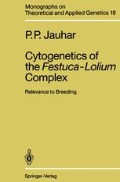Abstract
The fact that a large proportion of the grass species are natural polyploids clearly shows the importance of polyploidy in evolution. Of the different types of polyploids, allopolyploids are preponderant in nature because they enjoy the benefits of polyploidy and hybridity and, hence, are better adapted to diverse climatic conditions. The alloploids have enzyme diversity coded by related genes in different parental genomes. This biochemical versatility is believed to contribute to their selective advantage and fitness (see Gottlieb 1973; Adams and Allard 1977). Increased levels of enzyme production, probably stemming from dosage effects of the genes in the homoeologous sets of chromosomes in the allopolyploids, may also result in greater photosynthetic rates of higher polyploids in the same taxon. For example, Randall et al. (1977) found that a decaploid (2n = 10x = 70) Festuca arundinacea clone had higher net photosynthetic rate than the ten hexaploid (2n = 6x= 42) clones tested. The ribulose 1, 5-bisphosphate carboxylase activity in the decaploid was 1.3 to 2 times higher than that of a hexaploid selected from the cultivar Kentucky 31, suggesting that an altered genetic expression of this enzyme led to increased CO2 exchange rate in the former. Increases in ploidy level are reported to quantitatively alter photosynthesis-related properties in several other species (e.g., Setter et al. 1978) (however, see also Sect. 8.4.5).
Access this chapter
Tax calculation will be finalised at checkout
Purchases are for personal use only
Preview
Unable to display preview. Download preview PDF.
Author information
Authors and Affiliations
Rights and permissions
Copyright information
© 1993 Springer-Verlag Berlin Heidelberg
About this chapter
Cite this chapter
Jauhar, P.P. (1993). Natural and Induced Polyploidy. In: Cytogenetics of the Festuca-Lolium Complex. Monographs on Theoretical and Applied Genetics, vol 18. Springer, Berlin, Heidelberg. https://doi.org/10.1007/978-3-642-84086-9_8
Download citation
DOI: https://doi.org/10.1007/978-3-642-84086-9_8
Publisher Name: Springer, Berlin, Heidelberg
Print ISBN: 978-3-642-84088-3
Online ISBN: 978-3-642-84086-9
eBook Packages: Springer Book Archive

